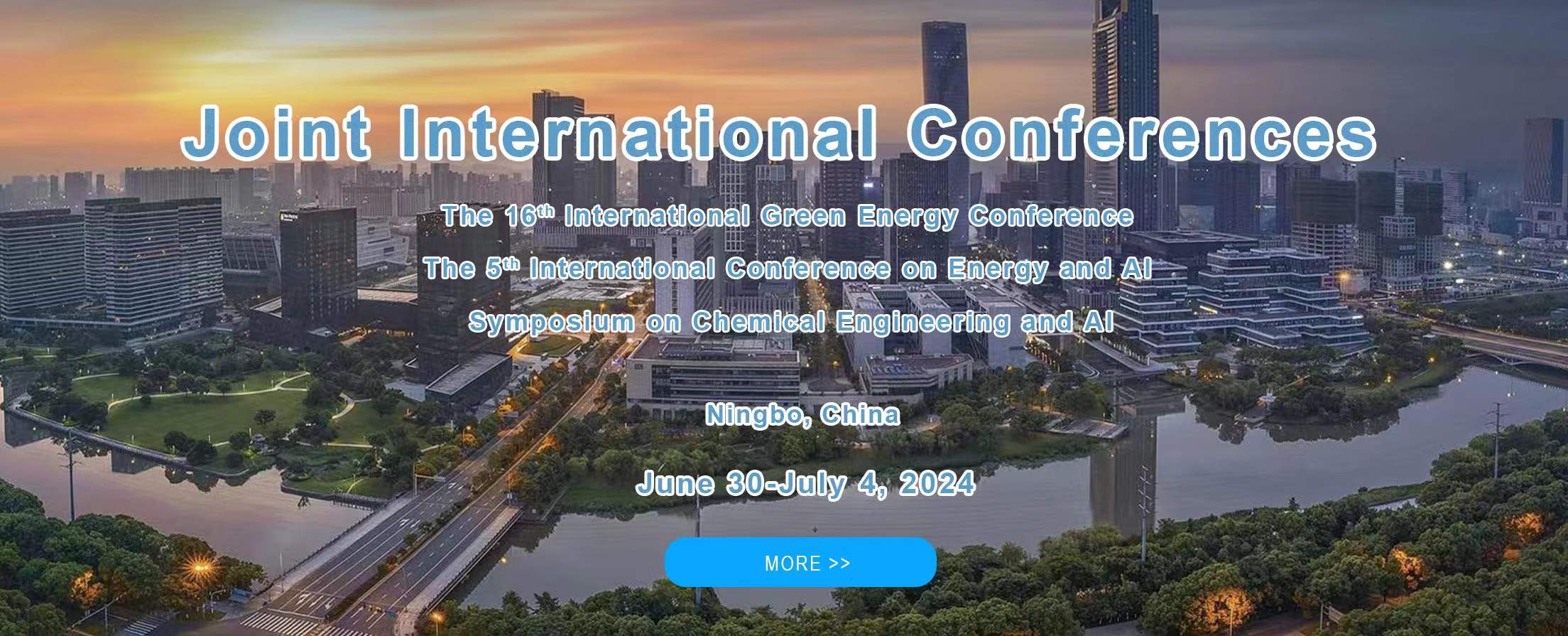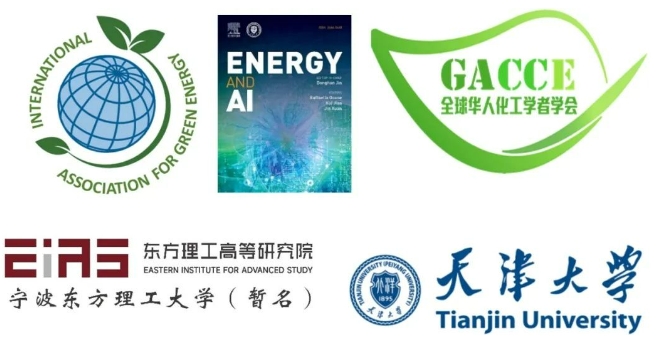Conference Chairs
Dongxiao Zhang, Eastern Institute of Technology, China
Xianguo Li, University of Waterloo, Canada
Jesse Zhu, Global Academy of Chinese Chemical Engineers
Conference Executive Chairs
Zhongchao Tan, Eastern Institute of Technology, China
Kui Jiao, Tianjin University, China
Jin Xuan, Surrey University, UK
Hesheng Yu, China University of Mining and Technology, China
International Organizing Committee
Zhongchao Tan, Eastern Institute of Technology, China
Kui Jiao, Tianjin University, China
Jin Xuan, Surrey University, UK
Hesheng Yu, China University of Mining and Tech., China
Hikmet Karakoc, Eskisehir Technical University, Turkey
SeongDae Kim, University of Tennessee, US
Xianguo Li, University of Waterloo, Canada
Jing Shi, University of Cincinnati, US
ChongWen Tong, University of Malaya, Malaysia
Qiuwang Wang, Xi'an Jiaotong University, China
XiaoYu Wu, University of Waterloo, Canada
Shouliang Yi, National Energy Technology Lab., US
Zhibin Yu, University of Glasgow, UK
Jian Zhao, Mississippi State University, US
International Advisory Committee
Suresh K. Aggarwal, University of Illinois at Chicago, US
Kalyan Annamalai, Texas A&M University, US
Adrian Bejan, Duke University, US
Feifei Bai, Griffith University, Australia
Alfonso Capozzoli, Polytechnic of Turin, Italy
S. H. Chan, Yuan Ze University
Ibrahim Dincer, Ontario Tech University, Canada
Qing Du, Tianjin University, China
Xili Duan, Memorial Univ. of Newfoundland, Canada
Qian Fu, Chongqing University, China
Fei Gao, Univ. of Tech. of Belfort-Montbeliard, France
Nesreen Ghaddar, American Univ. of Beirut, Lebanon
Joao F.P. Gomes, Instituto Superior de Engenharia de Lisboa, Portugal
Jinlong Gong, Tianjin University, China
Michael D. Guiver, Tianjin University, China
Shigeki Hasegawa, Toyoto Motor Company, Japan
Arif Hepbasli, Yasar University, Turkey
Zhongjun Hou, Shanghai Hydrogen Propulsion Technology Company, China
Hong Im, King Abdullah Univ. of Sci. and Tech, Saudi Arabia
Hilary I. Inyang, Univ. of North Carolina, Charlotte, US
Mejdi Jeguirim, Institut de Sciences des Matériaux de Mulhouse, France
Zhongyi Jiang, Tianjin University, China
Donghan Jin, Tianjin University, China
Hongguang Jin, Chinese Academy of Science, China
Mark J. Kaiser, Louisiana State University, US
G.A. Karim, University of Calgary, Canada
Birol Kilkis, Watts Radiant, US
Markus Kraft, University of Cambridge, UK
Chung K. Law, Princeton University, US
Bin Li, Tianjin University, China
Wen-Feng Lin, Loughborough University, UK
Xianke Lin, Ontario Tech University, Canada
Hongtan Liu, University of Miami, US
Henrik Madsen, Technical Univ. of Denmark, Denmark
Seyed Soheil Mansouri, Tech. Univ. of Denmark, Denmark
Daniele Marchisio, Polytechnic University of Turin, Italy
Mariano Martín Martín, University of Salamanca, Spain
John McPhee, University of Waterloo, Canada
Pingwen Ming, Tongji University, China
Jun Miyake, Osaka University, Japan
Meng Ni, The Hong Kong Polytechnic University
Raffaella Ocone, Heriot-Watt University, UK
Jae Wan Park, University of California Davis, US
Zhijun Peng, University of Bedfordshire, UK
Ronghui Qi, South China Univ. of Technology, China
Zhiguo Qu, Xi'an Jiaotong University, China
Gonçalo dos Reis, The University of Edinburgh, UK
Saffa Riffat, University of Nottingham, UK
Marc A. Rosen, Ontario Tech University, Canada
Kaushik Saha, IIT Delhi, India
Samaneh Shahgaldi, Université du Québec, Canada
Saher Al Shakhshir, General Motors Corp, US
Yixiang Shi, Tsinghua University, China
Gequn Shu, Univ. of Sci. and Tech. of China, China
Mirosław J. Skibniewsk, University of Maryland, US
Bent Sorensen, Roskilde University, Denmark
James G. Speight, CD & W Inc., US
Charles Stone, Êon Consultants ltd, Canada
Kai Sun, University of Tennessee, US
Andrea Tonello, Alpen-Adria University, Austria
Shuichi Torii, Kumamoto University, Japan
Yun Wang, University of California, US
Hai Wang, Stanford University, US
Huizhi Wang, Imperial College London, UK
Billy Wu, Imperial College London, UK
Linda Fu Xiao, The Hong Kong Polytechnic University
Rui Xiong, Beijing Institute of Technology, China
Fengying Yan, Tianjin University, China
Jinyue Yan, The Hong Kong Polytechnic University
Mingfa Yao, Tianjin University, China
Yan Yin, Tianjin University, China
Fengqi You, Cornell University, US
Sining Yun, Xi’an Univ. of Architecture and Tech., China
Nada Zamel, Fraunhofer Institute, Germany
Jiujun Zhang, Shanghai University, China
Technical Committee
Hesheng Yu, China Univ of Mining and Tech, (Co-Chair)
Jian Zhao, Mississippi State University, US (Co-Chair)
Xiangkun Cao, Massachusetts Institute of Tech, US
Xiaoqiang Cao, Shandong Univ. of Sci. and Tech, China
Xi Chen, Hunan Institute of Science and Tech., China
Zupeng Chen, Nanjing Forestry University, China
Linhao Fan, Tianjin University, China
Munur S. Herdem, Adiyaman University, Turkey
Sambhaji Kadam, University of Glasgow, UK
Hongxia Li, Khalifa Univ. of Science and Tech., UAE
Xiaoya Li, Nanyang Technological University, Singapore
Yifu Li, Kettering University, US
Youcai Liang, South China University of Tech., China
Hao Lu, Xinjiang University, China
Shiqi Ou, Oak Ridge National Laboratory, US
Zahra Hajabdollahi Ouderji, University of Glasgow, UK
Yuqing Wang, Beijing Institute of Technology, China
Yuesen Wang, Massachusetts Institute of Technology, US
Xiaoyu Wu, University of Waterloo, Canada
Lei Xing, Surrey University, UK
Guopeng Yu, Sun Yat-sen University, China
Yang Zhang, Tsinghua University, China
Hui Zhou, Tsinghua University, China
Local Organizing Committee
Zhongchao Tan, Eastern Institute of Technology, China (Chair)
Kui Jiao, Tianjin University, China (Co-Chair)
Hesheng Yu, China University of Mining and Tech., China (Co-Chair)
Yuanyuan Shao, University of Nottingham Ningbo, China (Co-Chair)
Xiangning Bu, China Univ. of Mining and Tech., China
Yunpei Cui, China Univ. of Mining and Tech., China
Xihong Liao, Eastern Institute of Technology, China
Jiayou Liu, China Univ. of Mining and Tech., China
Xiao Liu, Eastern Institute of Technology, China
Chao Ni, China Univ. of Mining and Tech., China
Hao Sun, China Univ. of Mining and Technology, China
Bowen Wang, Tianjin University, China,
Haiming Wang, Tsinghua University, China
Jiaqi Wang, Tianjin University, China
Xiaolin Yang, China Univ. of Mining and Tech., China
Kefei Zhang, China Univ. of Mining and Tech., China
Ruiwang Zuo, Tianjin University, China


